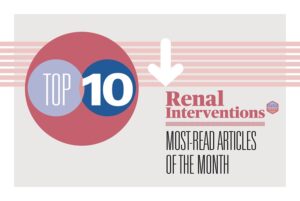 October brought with it one-year trial outcomes, technique recommendations, and meeting updates, with Venova Medical presenting one-year results from the VENOS-1 first-in-human (FIH) trial, renal denervation gaining class IIb recommendation from the European Society of Cardiology (ESC), and multiple updates from the Vascular Access Society of Britain and Ireland (VASBI) annual scientific meeting (26–27 September, Cardiff, UK) exploring a range of fascinating topics.
October brought with it one-year trial outcomes, technique recommendations, and meeting updates, with Venova Medical presenting one-year results from the VENOS-1 first-in-human (FIH) trial, renal denervation gaining class IIb recommendation from the European Society of Cardiology (ESC), and multiple updates from the Vascular Access Society of Britain and Ireland (VASBI) annual scientific meeting (26–27 September, Cardiff, UK) exploring a range of fascinating topics.
At the Controversies in Dialysis Access (CiDA) 2024 meeting (3–5 October, Washington D.C., USA), Robert Shahverdyan (Hamburg, Germany) gave a presentation sharing the one-year results of the VENOS-1 FIH study, which examined the Velocity (Venova Medical) percutaneous arteriovenous fistula (pAVF) system.
At the recent Cardiovascular and Interventional Radiological Society of Europe (CIRSE) annual meeting (14–18 September, Lisbon, Portugal), Kate Steiner (East and North Herts NHS Trust, Stevenage, UK) presented the results of a recent study comparing intimal hyperplasia measurements on ultrasound of pre- and post-percutaneous transluminal angioplasty (PTA) of arteriovenous (AV) access stenoses with both paclitaxel-coated balloons and plain balloon angioplasty.
Latest guidelines from the ESC on the management of blood pressure and hypertension include a recommendation for the use of renal denervation as a tool to reduce blood pressure.
A recent analysis reveals that the number of chronic kidney disease (CKD) cases in women around the globe nearly tripled in the past three decades. Also, type 2 diabetes and hypertension were the leading causes of CKD related deaths in women. The research was presented at the American Society of Nephrology (ASN) Kidney Week 2024 (23–27 October, San Diego, USA).
At the latest VASBI annual scientific meeting (26–27 September, Cardiff, UK), an interactive discussion that followed a presentation given by Nicholas Inston (University Hospitals Birmingham, Birmingham, UK) explored the subject of AI usage in medical research in further detail, with audience members raising questions about the accuracy of work produced via the use of AI, the amount of work needed to ensure that data was correct, and the availability, or lack thereof, of data that can be used in AI generators.
At the recent VASBI annual scientific meeting, presentations on vascular access, the use of artificial intelligence (AI), the impact of socioeconomic factors, and much more led to in-depth discussions across the multidisciplinary audience.
Michael Corr (Belfast City Hospital, Belfast, UK) gave an abstract presentation at the latest VASBI annual scientific meeting looking at a retrospective study on how health literacy and socioeconomic deprivation has an impact on vascular access in patients with end-stage kidney disease (ESKD), for which he was awarded the prize for best abstract.
Akebia Therapeutics and U.S. Renal Care (USRC) announced entry into a multi-year commercial supply contract encompassing all USRC dialysis centres. The contract enables USRC attending physicians to prescribe Vafseo for patients on dialysis as deemed clinically appropriate when it is expected to be available in January 2025.
B Braun has announced that the US Food and Drug Administration (FDA) has granted 510(k) clearance for the Introcan Safety 2 deep access intravenous (IV) catheter, the newest addition to the Introcan Safety 2 IV catheter portfolio.
BD recently announced the launch of its new intraosseous (IO) vascular access system, enabling access for rapid delivery of fluids or medication in critical emergency situations. The procedure involves inserting a needle into the bone marrow cavity when intravenous (IV) access is challenging or delayed.












